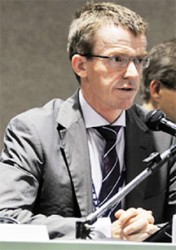Guyana and Norway are continuing discussions on the controversial Amalia Falls Hydroelectricity Project (AFHP) and Oslo recently asked the Inter-American Development Bank (IDB) to receive US$80 million as Guyana’s equity in the project.
The transfer of the funds outside of the Guyana REDD+ Investment Fund (GRIF) as well as the fact that the project is moving ahead in the absence of the National Assembly which was suspended by Presi-dent Donald Ramotar last month has raised a number of questions among observers. Among others, questions have been raised about the transparency as well as the secrecy surrounding the project.
Guyana and Norway have a five-year pact under which Oslo will pay up to US$250 million based on Guyana’s efforts in protecting its forest and meeting enabling indicators. Thus far, Guyana has earned US$150 million under the agreement. The US$80 million is expected to come from this sum but the direct transfer from Norway to the IDB outside of the World Bank-administered GRIF has raised some questions.
In April, Ramotar had said that the IDB was working with Guyana on the implementation of a major project on renewable energy which will see Guyana receiving about 90 per cent of its energy from renewable sources.

While he did not identify the project, it is likely the AFHP which government had vowed to resuscitate after the developers walked away last year.
Earlier, in March, the president told reporters that the controversial AFHP is once again being examined by the IDB board and they would hopefully be wrapping up soon.
He was also hopeful that the developers, Sithe Global, who withdrew, would return. In this year’s budget, US$80 million was listed as equity for the AFHP which is due to come from the GRIF. Before US-based Sithe Global pulled out here last year August as the developer of the US$858.2 million, 165-megawatt hydro venture, the AFHP was shrouded in controversy as costs escalated.
Sithe Global pulled out of the AFHP last August citing a lack of political consensus. The company had issued explicit statements that unless all three parties in Parliament backed two measures for the controversial US$858 million project it would pull out.
The measures were not fully supported and the company walked away. Recently, it was revealed that the costs for the road had also shot up.
Based on documents obtained by Stabroek News, Norwegian and IDB representatives are continuing discussions on the project and IDB board approval of the AFHP is expected next year.
In a letter dated November 11, 2014 to President of the IDB Luis Alberto Moreno, Director of Norway’s International Climate and Forest Initiative Per Fedrik Pharo noted that representatives of the Norwegian government have held conversations with IDB representatives regarding a grant contribution to the AFHP.

“In this sense and understanding the importance of the IDB’s role in the effective completion of the Project, I would like to manifest the Norwegian Climate and Forest Initiative intention to contribute — through the Norwegian Agency for Development Cooperation’s (NORAD) — to said Project and therefore request the IDB to receive in administration a grant contribution of eighty million, thirty-five thousand US dollars (US$80,035,000)…that will enable the Govern-ment of Guyana to satisfy its equity obligations under the Project,” he wrote.
“In view of specific NORAD budgetary re-quirements, we would appreciate if IDB could receive and administer the contribution no later than December 12, 2014,” Pharo said.
He added that the support is conditioned upon the project being approved by the Board of Executive Directors of the IDB “which we gather will happen in the course of 2015.”
Once approved, NORAD and the IDB will sign an Administrative Agreement that will further detail the terms and conditions of the contribution. If the project is not approved, the contribution would then be returned to NORAD, or as the parties otherwise agree, Pharo said.




